It’s essential to have clean water in your household, no matter what. Yet, this isn’t always easy when your primary source is a private well.
After numerous product evaluation and testing, we determined the best whole house well water filter to be the Springwell whole house filter, an excellent system that removes stubborn well water contaminants. AquaOX and Aquasana are also good brands to consider.
To ensure you get (and maintain) the cleanest water possible for you and your family, choose one of these best well water filtration systems for your home.
Well Water Filter Comparison Table
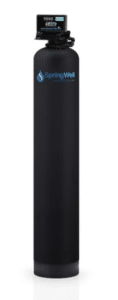
- High water pressure at 12-20 GPM
- 6-month satisfaction guaranty
- Specializes in iron, manganese, and sulfur removal

- Operates at an excellent 15-35 GPM
- 7-stage filtration process
- 10-year warranty
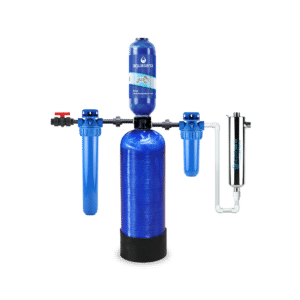
- Easy to install & maintain
- 7 GPM flow rate
- 500,000 gallon capacity
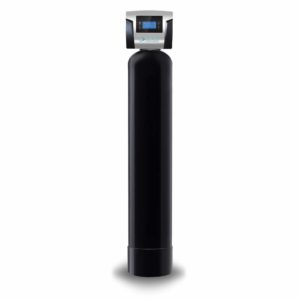
- Filters at 6-12 GPM to maintain excellent water pressure
- Vacation Mode to save energy
- Excellent iron & manganese removal
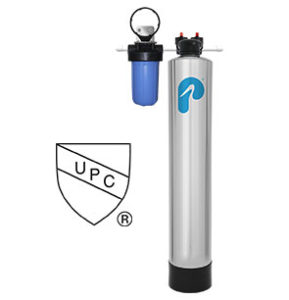
- 4-stage filtration process
- UV system eliminates 99.9% of microorganisms
- 6000,000 gallon capacity over a 5-year lifestpan
Criteria For Choosing a Well Water Filtration System
A high-quality whole house water filtration system is crucial to building a healthy home. Because of how important these are to you and your family’s safety, you must do all you can to ensure you purchase a quality product without compromise.
Here’s a guide on how to buy quality water filter for well:
Step 1: Test your well water to identify possible contaminants
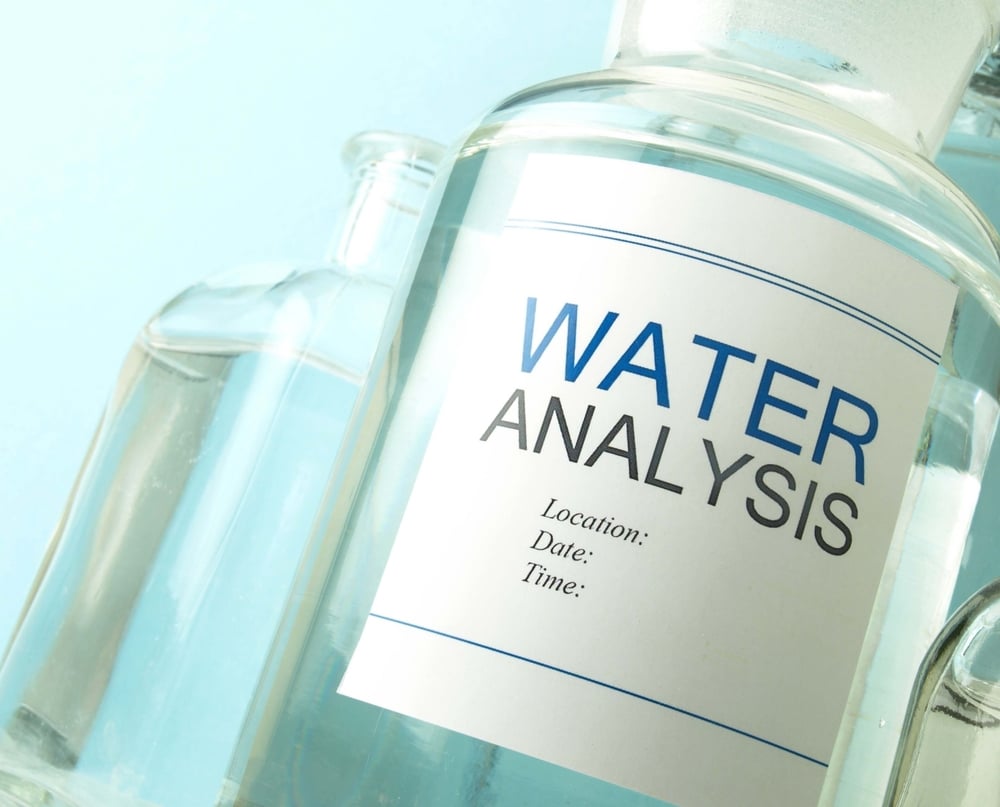
To start the process of buying your well water filtration system, you must establish a baseline for your water quality by running a test.
(Whether you find contaminants in your well water or not, you will still need to move forward with purchasing a filtration system. However, identifying the specific contaminants in your water can clue you in to your water source’s particular vulnerabilities and inform you of which qualities to look for in the available systems.)
The steps below will help you identify hazardous substances in your private well with professional help:
- Contact your local Public Health or Environmental Services Department.
- Request information for ongoing private well-testing programs. If there are none available, ask for their recommended laboratories that can conduct an analysis.
- Try visiting the Department’s website. They typically have a directory of accredited laboratories on the platform.
- Upon contacting the laboratory or Department testing authority, you will receive instructions on collecting the necessary sample(s). Testing equipment, such as bottles, will be provided as well.
- You must collect the sample from the same faucet where you get your drinking water. Avoid touching the inside of the sample bottle.
Make sure to test your well every year for coliform bacteria and nitrate. Experts recommend that you test the well for arsenic and lead at least once, especially if it was constructed before 2008. Families with babies should test for manganese as well.
What Contaminants Might You Find in Your Well Water?
It’s easy to get overwhelmed in all the scientific terminology surrounding the process of testing your well water. Although numerous things might be present, only a handful are common enough that you’ll need to learn to recognize them categorically.
The contaminants you’re most likely to see in your well water (if any) are as follows:
- Microorganisms: This includes viruses, bacteria, and parasites, which can be found everywhere, even on the surface of your skin. Though some are harmless – or even beneficial to your health – others, often found in human sewage, can infect you with gastrointestinal diseases.
- Note: Microorganisms can wind up in your well due to run-off from melting snow or rainfall. There’s no guaranteed way to prevent this water from flowing directly into your well or seeping underground. So, your filtration system must be equipped to filter these microscopic creatures out.
- Heavy metals: There are several metals you might find contaminating your well, including arsenic, copper, and lead. Groundwater movement is the most common way these metals can enter your water source, in addition to seepage and run-off. These can cause acute or chronic toxicity and damage the liver, kidneys, and intestines.
- Nitrate and nitrate: These can seep or run into your well water from fertilizers, sewage, and animal waste. Nitrates and nitrites are severe threats to your family’s health, especially infants. Babies that ingest excess nitrate (which converts to nitrite in the body) may develop methemoglobinemia, also known as “blue baby syndrome.”
- Organic chemicals: Several household items can introduce organic chemicals into your well water. This includes products like paints, solvents, sealants, and disinfectants. Waste disposal, accidental spills, and run-off are responsible for this type of contamination, damaging the kidneys, liver, nervous system, and more.
- Radionuclides: When elements like uranium and radium become radioactive, they are known as “radionuclides.” They’re incredibly dangerous to your safety. Industrial activities like coal mining typically cause these leaks, ultimately exposing you to the risk of toxicity in the kidneys and cancer.
- Fluoride: Since this chemical can help prevent tooth decay, it’s quite common in aquifers and private wells. Unfortunately, it can occur in excess, and consuming too much increases the risk of skeletal fluorosis.
Step 2: Know the different types of filters available
Now that you know the specific well water contaminants you’re dealing with, it’s time to choose a suitable filtration system. Depending on your results, you may need a filter that specializes in filtering out specific chemicals, microorganisms, or other contaminants.
Here are the different types and reasons why you might need them over alternatives:
- Activated carbon filter: These are specially designed to remove organic contaminants responsible for poor taste and odor in your water. Different designs specialize in specific resolutions. For example, some carbon filters may specifically remove chlorination byproducts, while others focus on removing cleaning solvents and pesticides.
- Weaknesses: While they are capable of eliminating heavy metals like lead and copper, they are only “efficient.” Activated carbon filters fail to remove nitrates, bacteria, and dissolved minerals.
- Ion exchange unit: Units in this category are excellent for “hard” water. They excel in the removal of minerals such as calcium and magnesium and can even get rid of radionuclides. These units can remove fluoride as well.
- Weaknesses: These filters can become clogged with ion-exchange resin and thus lose their water-softening capabilities if the well water contains oxidized iron or iron bacteria.
- Reverse osmosis unit: These filtration systems are known to eliminate dissolved inorganic and organic compounds, including nitrates and sodium. If your water has been tasting or smelling bad, as of late, a reverse osmosis unit can resolve that issue. These may also reduce concentrations of pesticides, chloroform, and other harmful chemicals.
- Weaknesses: As effective as these units are, they cannot remove all inorganic and organic compounds in your well water.
- Distillation unit: Filtration systems in this group can remove nitrates, bacteria, heavy metals, radionuclides, (most) organic compounds, and much more. Plus, they don’t only remove bacteria but also kill them, adding an extra layer of security. You can also trust these filtration systems to soften any “hard” water. See the best water distillers.
- Weaknesses: Some volatile organic contaminants (VOCs) can get past these treatment systems, along with specific pesticides and solvents. Additionally, once bacteria are removed, there’s a chance they will recolonize when the system is inactive.
Which is Better: Reverse Osmosis or Filtration?
Osmosis is the natural process of a liquid (in this case, water) moving from a place with a low concentration to another where it can be highly concentrated. This means, if there is something to absorb the liquid (where the liquid has a low concentration), the fluid will move into that thing or vessel through a membrane.
Reverse osmosis (RO) flips this on its head by forcing the liquid through a membrane, allowing some particles to pass and keeping others behind.
So, the RO unit takes your well water and pushes it through a semipermeable membrane, thereby separating it from as many contaminants as possible. In a way, this isn’t filtering the water from contaminants but vice versa.
On the other hand, filters allow the water to flow naturally without manipulating the process and takes the contaminants out as the fluids pass through the membrane. This way, activated carbon filters (the most common type of filter) can efficiently remove harmful chemicals, bad tastes and smells, and VOCs.
On the other hand, RO systems are great for getting rid of microorganisms, heavy metals, organic chemicals, salts, and nitrates. However, they’re less effective at eliminating VOCs, solvents, and specific organic substances such as benzene, toluene, and trihalomethanes variants.
The filtration system that’s best for you depends on your well water test results and the most significant contamination risks based on your well’s location. Evaluate the current status of your well before moving on to Step 3.
Step 3: Consider installation and maintenance requirements and cost
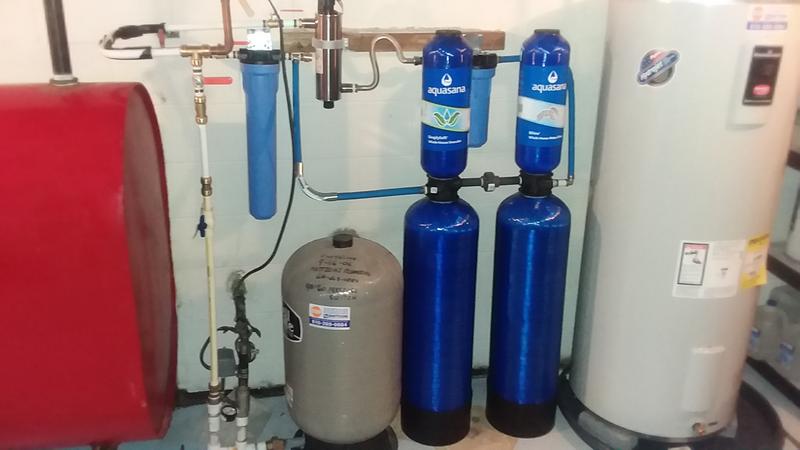
As you might expect, installing a well water filtration system into your home is a significant financial commitment. You’ll need to budget carefully to ensure you can not only install the system but correctly maintain it over time.
On average, you can expect to pay between $600-4,200 to have your water filter installed. The unit itself will generally run you between $1,000-4,000. Individual prices are determined by the model, filtration and treatment capabilities, and the total number of gallons it can treat in a given period.
Of course, this is the price for a residential-grade filtration system. Commercial systems cost significantly more, ranging from $5,000 on the low end up to $14,000. (This price covers both the purchase of the filtration equipment and installation.)
In both cases, remember that there may be extra costs associated with your water filter, namely labor, and materials. These additional factors may add between $300-700 to your total.
Further, the specific type of system might cause your estimated price to rise or fall.
On the other hand, you should budget between $250-4,000 for RO systems. Be careful when planning to install an RO system, as manufacturers design these for faucet-based filtration and wells. You’ll need to ensure that you’re getting the correct model. Otherwise, you may end up over- or under-budgeting and not getting the required filtration.
Step 4: Pick a system that falls within your budget
Now that you have all the necessary information on your well water’s current contaminants (if any), the type of filtration system you need, and all relevant price points, you are fully prepared to finalize your decision on which system will work best for you.
You’ll need to choose the system that falls comfortably within your budget. However, remember that this does not only include the initial purchase and installation cost but the price of maintaining the well filtration system over time.
As mentioned above, you must test these systems at least once annually to ensure they are removing contaminants efficiently.
In addition to the suggestions above, experts recommend that you have your water tested every 12-14 months for E. coli bacteria. Further, you should have your well water evaluated for its pH levels and total dissolved solids (TDS) once every three years. This will ensure that your well or plumbing system does not corrode, an issue that can present more significant health risks.
Test prices will vary depending on the chemicals, organic compounds, and other contaminants you need to evaluate. Costs will also vary based on where you live. For more detailed information on local costs based in your region, see the Environmental Protection Agency’s (EPA) directory for state water well programs.
Examples of Well Water Filtration System Maintenance Costs
Although your budget will change based on your locale, type of well water filtration system, and contaminants of concern, there are some general guidelines you can lean on to shape your expectations. Below are two pricing examples from well water service providers to give you an idea of how much you might be paying over the coming years:
- Community Science Institute: Prices for the most essential well water testing procedures are as follows:
- Coliform and E. coli bacteria: $45
- Nitrate and nitrate: $35
- TDSs: $25
- Heavy metals: $30
- VOCs: $113
- Water Research Center: Although the WRC is based in Pennsylvania, you can have your water testing kit delivered to your home address nationwide. Prices are as follows:
- Quick screen package (iron, alkalinity, hardness, pH, & TDS): $89
- BNLC (bacteria, nitrate, nitrite, lead, & copper): $135
- Nuisance bacteria testing: $45-110
- Pathogenic bacteria screening: $60
Reviews: Best Whole House Well Water Filter
Here are our top recommendations for water filtration systems:
- Springwell Whole House Well Water Filter
- AquaOx Well Water Filter
- Aquasana Filter & Softener Combo
- Quality Water Treatment Filtration System
- Pelican Well Water Systems
1. Springwell Whole House Well Water Filter

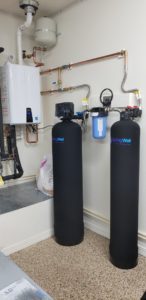
In our opinion, the best whole house well water filter is the SpringWell WS1. Its is crafted with sustainability and budget-friendliness in mind, allowing all private-well-dependent homeowners safe, fair access to secure drinking water. The SpringWell filter is designed to eliminate any bad tastes, smells, and nasty colors from your water, ensuring a positive drinking, cooking, and hygiene experience with every drop.
Further, the filter will maintain suitable water pressure, so you don’t have to waste gallons upon gallons to get everything cleaned.
This system can provide clean water for 1-4 bathrooms, while the MS4 version can support four or more. In each room, you can enjoy its ability to remove up to 8 ppm (parts per million), 7 ppm of iron, and 1 ppm of manganese.
Finally, it requires minimal maintenance, thanks to the automatic daily backwash function. SpringWell engineers kept homeowner comfort and convenience at the forefront of their minds when designing this filter, also demonstrated by the 6-month satisfaction guarantee.
- Specializes in the removal of iron, manganese, and sulfur
- Eliminates unpleasant tastes and smells from well water
- Maintains high water pressure in 1-4+ bedrooms, depending on the model
- Protected by a 6-month satisfaction (money-back) guarantee and a lifetime warranty (warranty applies only to the tanks and valves)
- Operates at 12-20 GPM (gallon per minute), depending on the model
- Warranty only applies to specific parts of the well filter
- Filters that specialize in heavy metal removal may not be the best for removing bacteria
2. AquaOX Whole House Well Filter

This whole house filter for well water is specially designed to eliminate as many contaminants from your drinking water as possible. Each of the seven filtration stages focuses on a different category of harmful elements, including sediment, bacteria, heavy metals, hydrogen sulfide, and VOCs.
Once the water has been thoroughly cleaned, the system ensures that the water pressure remains appropriately high. One of its best features is the self-cleaning mechanism, powered by the Vortech plates. This sanitizes backwash and prevents corrosion to ensure a long lifespan for your system.
The AquaOX filter comes in two sizes: regular and extra-large (XL). The former treats water for 2-3 bathrooms at 15 GPM, while the latter supports four or more at 35+ GPM. If you’re looking for a multifaceted filtration system that can remove almost any well water contaminant you can imagine, this AquaOX model is ideal.
- Operates at 15-35+ GPM, depending on the model
- Self-cleaning, thanks to the Vortech plates
- Can remove a wide range of contaminants, including heavy metals, VOCs, some bacteria, and sediment
- Its 7-stage filtration process outperforms most units on the market
- Protected by a 10-year warranty
- Not effective against many microorganisms (only covers “some” bacteria)
- This system cannot remove fluoride
3. Aquasana Well Water Filter & Softener Combo

This system is equipped with an upgraded carbon media filter, 20″ pre-filter, post-filter, and an ultraviolet filter to top it all off. You can confidently drink, cook, and wash with your water, knowing you are protected from heavy metals like lead and mercury, pesticides, herbicides, VOCs, and microorganisms.
The Aquasana filter has a dual tank design to increase the amount of time the water’s in contact with the filtration media. At the same time, it is equipped with SCM salt-free technology to prevent clogging throughout your residential plumbing, maintaining excellent water quality and pressure.
Its design also makes it very easy to install and maintain over the years, primarily due to the user-friendly brass fittings and easy-to-remove bend supports and shut-off valves. It does not require backflushes or drainage lines for upkeep.
The copper-zinc and mineral stone reduces water-soluble heavy metals and inhibits bacterial and algal growth. Plus, the activated carbon filter removes organic compounds. The sediment pre-filter and post-filter work together to remove sediment, rust, and other debris, and all the while, the salt-free water conditioner prevents mineral accumulation.
The bonus UV filter will ensure that little to no bacteria or viruses will make their home in your residential water system. If you want peace of mind and easy maintenance in your filtration system, Aquasana is the way to go.
- Several warranty options, even for UV filters
- Easy to install and maintain
- 7 GPM flow rate
- Massive gallon capacity at 500,000 gallons
- Protects against a wide variety of contaminants with UV filter for added assurance
- Some customers still experienced water scaling
- Reports of leaking
4. Quality Water Treatment Well Water Filtration System
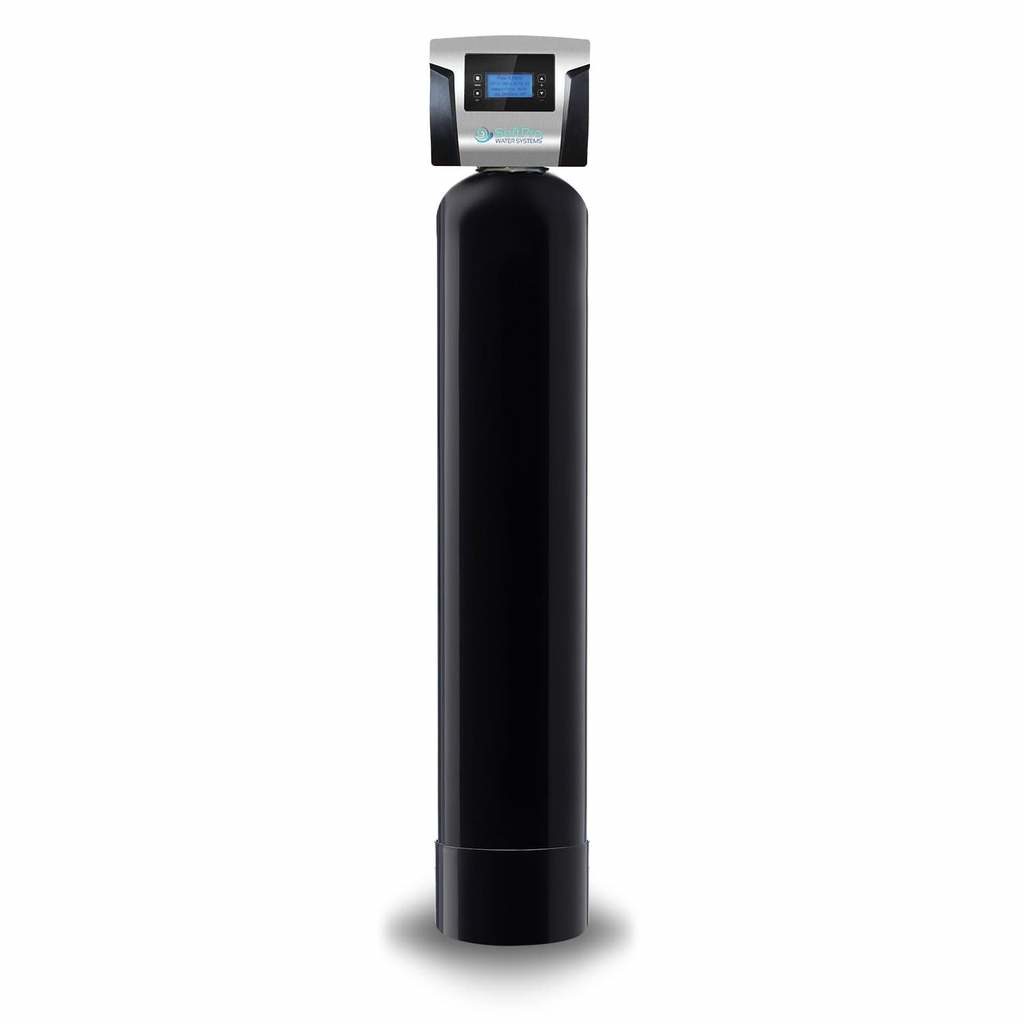
The SoftPro water system prioritizes drinking water’s safety during and at the end of the filtration process. Rest assured that your water will be free of iron, manganese, and hydrogen sulfide with no chemicals or unnatural methods used to clean it.
The AIO tech works by exposing iron to oxygen, naturally removing the unwanted metal from your supply. This technique can eliminate up to 30 ppm of iron, 7 ppm of manganese, and 5 ppm of hydrogen sulfide.
Plus, you can program the SoftPro’s control valve to operate precisely as you want, with a bonus “Vacation Mode” setting. While you’re away from home, the water softener will pause to save energy. For example, imagine that you’re gone for over seven days. In that case, the SoftPro will initiate a system refresh to inhibit bacterial growth, ensuring clean water when you return.
Depending on the model you purchase, the system can filter at 6-12 GPM and maintains excellent water pressure for optimal use and health in every room.
- The best whole house well water filter for families on a budget
- Includes a water softening feature
- 6-12 GPM, depending on the model
- Specializes in the removal of iron and manganese
- Natural, chemical-free filtration
- It may not be the best at removing microorganisms
- Some customers had difficulty with installation
5. Pelican Well Water Systems
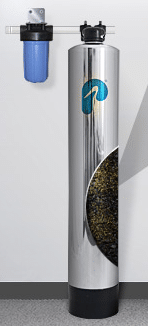
This water filter is one of the best well water filtration systems on the market, and it’s budget-friendly.
It uses a 4-stage filtration process that provides water so clean you’ll think it’s straight from the spring. It removes sediment and harmful chemicals and prevents bacterial growth, primarily through the UV system, eliminating up to 99.9% of microorganisms. With all these treatment methods, your water will taste and look great.
Since this system filters water at the home’s point-of-entry (POE), it lessens the amount of water wasted, resulting in a more sustainable treatment process. Further, the Pelican water system does not require electricity, shrinking your environmental footprint even more.
Along with the inhibition of bacterial growth, the system’s specialized copper-zinc filter prevents algal growth as well, ensuring that your water is free of additional microscopic pathogens.
The system comes ready-to-install to reduce hassle and has a 600,000 gallon capacity over a 5-year lifespan. You’ll hardly need to think about your purification system ever again with the easy install and multifaceted protection of the Pelican Water System whole house well water filter.
- Budget-friendly, costs only a fraction of other manufacturers’ systems
- It doesn’t require electricity to operate
- Filters water at POE for maximum sustainability
- 600,000-gallon capacity
- Easy installation and effortless maintenance
- Added protection against microorganisms only comes with the upgraded package with a UV filter
- Customers reported complications with stallation
Importance of a Quality Well Water System for Your Health
Contrary to some beliefs, explicit, direct contamination – such as spillage or run-off – is not the only way private water supplies can be compromised. Some homeowners don’t realize this and so express doubt regarding the need for a water filter when asking, “Does well water need to be filtered?”
Many naturally-occurring chemicals such as arsenic and radon can soak into the soil and threaten the well’s safety. Further, agricultural or private use of pesticides and animal waste management can harm the water quality as well.
As mentioned above, the vast majority of illnesses and deaths worldwide are direct consequences of poor water quality. Specific diseases that a dependable well water filtration system can protect you from include:
- Typhoid fever: Caused by the Salmonella typhi bacteria species, this disease is especially threatening to children. One of the most prominent causes is contaminated water. Symptoms include a high fever, headaches, and digestive problems, including stomach pain, constipation, and diarrhea. Sadly, this condition can be fatal.
- Cholera: If your well is contaminated with Vibrio cholerae, you could be at risk of developing this illness. The most common symptoms include diarrhea, nausea, vomiting, severe dehydration, and an imbalance in your body’s electrolytes. Those infected with cholera can recover, but without immediate medical attention, it can be fatal.
- Dental fluorosis: If your well water is contaminated with excess fluoride, you may be at risk of developing fluorosis. Most symptoms are cosmetic, including yellowing or browning of the teeth and irregularities on the teeth’s surfaces. In some cases, patients may even form “pits” on the tooth.
- Kids eight years and younger face an exceptionally high fluorosis risk, as this is a formative period for dental health.
You might also experience severe medical complications, even if they aren’t associated with diagnosed illnesses. The most common water-related health problems you might come down with include:
- Acute or chronic toxicity
- This is most likely the result of heavy metal ingestion, which can affect the liver, kidneys, and intestines.
- Anemia
- Damage to the circulatory system
- Circulatory system complications
- Harm to the reproductive system
Since there is so much on the line in terms of your and your family’s health, you can’t afford to cut corners when it comes to buying a well water filtration system for your home. The price may be a bit intimidating up front, but your safety is worth it, as investing in a high-quality, reliable well water filter may save your life one day.
What is the Best Filter to Remove Iron from Well Water?
The best filters to remove iron are quite easy to remember and are simply known as “iron filters.” The best examples are the Quality Water Treatment’s SoftPro system and the SpringWell Well System, described above.
Interestingly, these aren’t the only treatment options that can take care of your iron problem. When used in combination with a water softener (see top rated water softeners), you can get rid of even more iron, as these systems can remove up to 10 mg/L of iron. (However, the average efficiency stands between 2-5 mg/L.)
Please note that having too much iron in your well water does not pose the same threat as many other heavy metals would. Instead, this one is nothing more than an inconvenience, creating a bad taste and unsightly drinks.
An indirect risk of excessive iron in water is harmful organisms’ accelerated growth, as many bacteria require iron to mature.
What Are The Benefits of Well Water Filter?
The benefits of installing a water filtration system aren’t restricted to the residents’ health and safety. These units can also be advantageous for the overall home, specifically by boosting its market value.
This is partially why many homeowners and property managers refer to these systems as “investments-” but not just any investment. These are guaranteed to earn you a return on the money you’ve dedicated to upkeep over the years.
The primary reasons you can expect a satisfying ROI (return on investment) after installing a well water filtration system are as follows:
- Future residents will have clean water.
- Prospective homeowners will appreciate the added efficiency for home appliances.
- Hard water buildup or iron-related debris accumulation are to blame for clogged pipes, leaky plumbing, and low water pressure. Since well water filters can resolve or prevent these issues, your home’s value may rise substantially.
- Water filters ensure that laundry systems can operate smoothly and in an eco-friendly manner.
- Mineral imbalances in the water, such as excess calcium, can react negatively with detergents. These chemical reactions leave residue on clothing, leading homeowners to put their clothes through excessive rinse cycles to prevent discomfort.
Filtration systems are among the many things you can add to your home to improve the residents’ wellbeing and boost the value at the same time. This is yet another reason why you want to purchase a high-quality system and avoid making unnecessary compromises, so you can get your full money’s worth, plus some.
FAQs: What Questions are Other Buyers Asking?
You may still have a few questions about the logistics of preparing for a well water filtration system or specific models.
See the FAQs below to resolve any lingering uncertainties or confusion.
Well water filtration happens in three major phases:
Sediment pre-filtration: The first thing to get filtered out when the water hits the filtration system is sediment. The initial layer is known as the “pre-filter,” which is designed to get rid of relatively large debris like sand, dirt, and rust.
Mineral filtration: A finer filter comes next, removing heavy metals, chlorine, bacteria, and other small particles and microorganisms.
Active carbon filtration: This happens at the same time as the mineral filtration. This filter has wide, ridged pores and is specially designed to absorb water contaminants, especially VOCs and pesticides. This phase also improves the waters’ taste and smell.
Depending on the type of filtration system you purchase, there may be additional phases that aim to remove lingering bacteria.
The most reputable well water brands on the market include SpringWell, AquaOX, Aquasana, Quality Water Treatment, and Pelican Water Systems. They each maintain high levels of consistency and integrity and have kept their customers’ drinking water safe for years.
A residential well water system costs $1,000-4,000 on average. Installation prices range between $600-4,200, and any added labor or materials may add $300-700.
Remember that you’ll need to maintain the system over the years, which adds annual costs that may exceed $100. (Not all maintenance tests are annual. You can get away with doing some tests every 2-3 years.)
It is possible to install a well water filter on your own. However, please understand that you run the risk of incorrect installation and system damages without professional help. Consequentially, this also puts your health at risk. Because of this, it is much safer to call a professional for installation instead.
You can install a well filter outside. However, you must enclose it in a weather-proof shelter since harsh environmental elements (i.e., wind, rain, sun exposure) can reduce its longevity.

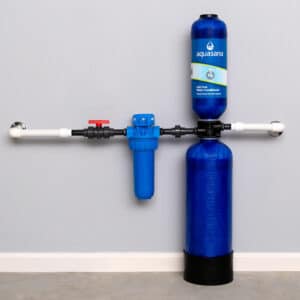
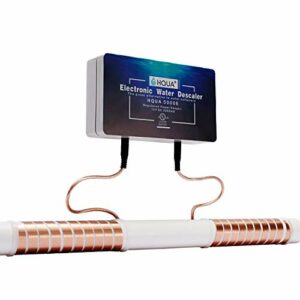
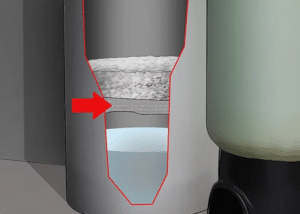
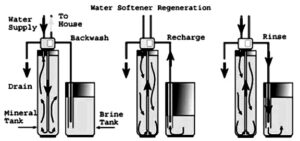
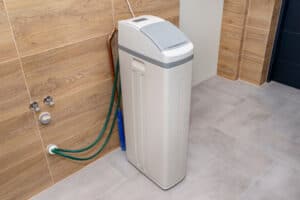


My family installed #1, although it was a bit difficult to install, but the quality is very effective. The difference can be seen very clearly, there are no more residues and stains on the sink. The water tastes so much better, the strange smells and tastes disappear completely.
Thanks, James, really appreciate your feedback and glad the system is performing well for your family!